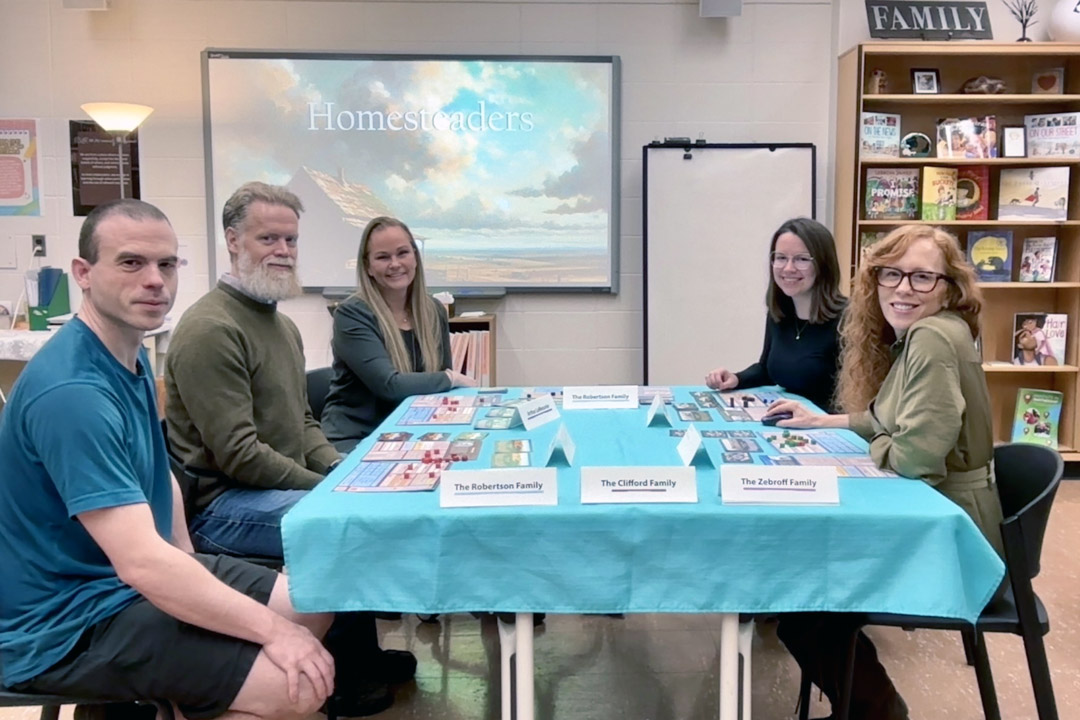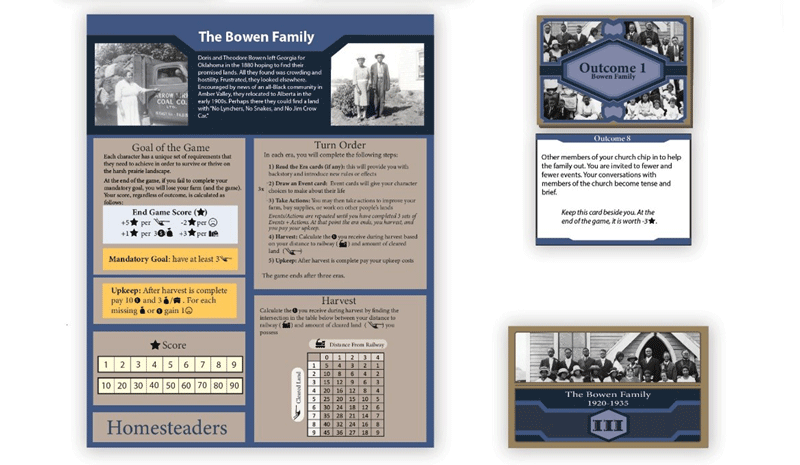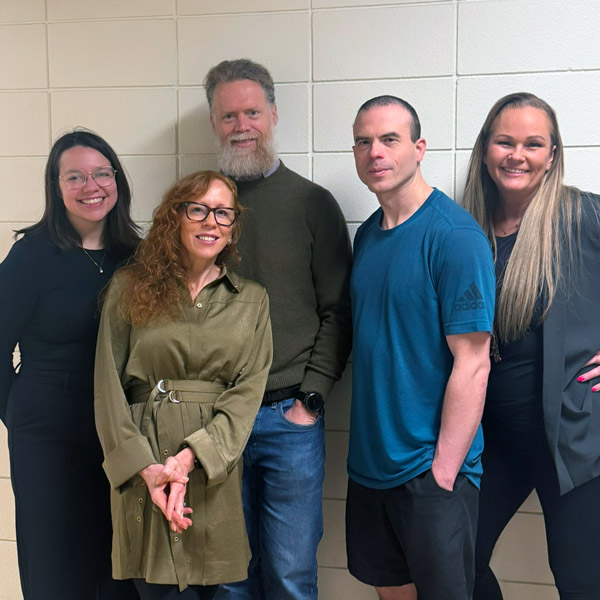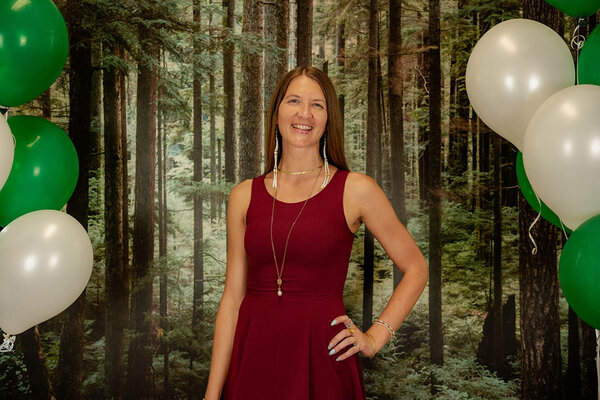
USask team wins international teaching award for Canadian history game
Homesteaders teaches the history of prairie settlement through tabletop gaming
By Chris Putnam
The creators of a tabletop game that transports players to the era of prairie settlement have won a prestigious international award for teaching innovation.
A team of five University of Saskatchewan (USask) teachers from the College of Arts and Science and the College of Education created the game, called Homesteaders, and tested its potential as a tool for teaching about late 19th and early 20th century history on the Canadian prairies. Their project has won a D2L Innovation Award in Teaching and Learning from the Society for Teaching and Learning in Higher Education (STLHE).
The team members—Dr. Benjamin Hoy (PhD) and Dr. Jim Clifford (PhD), associate professors in the Department of History; Dr. Paula MacDowell (PhD), assistant professor in the Department of Curriculum Studies; Dr. Judy Jaunzems-Fernuk (PhD), lecturer in the Department of Curriculum Studies; and Jessy Lee Saas, PhD candidate in the Department of History—started work on the project in 2023. Since then, Homesteaders has been played by more than 500 people in four provinces.
“I am extremely pleased, on behalf of the USask community, to extend heartfelt congratulations to the interdisciplinary Homesteaders team on this well-deserved recognition. Their game-based learning resource exemplifies the very best of USask’s innovation in student-centered learning. The team have enabled the ongoing creation of meaningful learning experiences for students, scholars and members of the public across the country. In doing so they have supported important knowledge and skill development whilst engendering empathy for people in the past and the difficult contexts they had to navigate,” said Dr. Nancy Turner (PhD), USask interim associate provost, teaching innovation and strategic initiatives.
The D2L Award recognizes post-secondary education teams from anywhere in the world for innovative approaches that promote student-centred teaching and learning. The award will be presented at the STLHE Conference in Saskatoon on June 10–13.
What games can teach
Like many of the project partners, Hoy—who designed and built Homesteaders—has often used games as teaching tools in his USask courses.
“One of the things that I find the hardest to teach is historical empathy—taking the concerns and problems of people in the past seriously. It’s hard to show in a lecture. It's really easy to show in a game,” said Hoy.

Homesteaders puts players in the role of one of nine families from a variety of ethnic, economic and social backgrounds while they try to make their way as early farmers on the Canadian prairies. As the game progresses, players are presented with small pieces of story and asked to make choices on how to proceed. For instance, a family might need to weigh the short-term versus long-term costs and benefits of sending one of their children to train as a teacher or enlist in the First World War.
Just as in real life, the options are limited and the consequences of each choice are not always clear.
“In a lecture, you can talk about how a person’s life outcomes are determined by structural factors and not just the choices they make. You can tell people about structural discrimination. You can tell them about environmental disasters or about the importance of where the railway goes to a farmer's success. But it's very different to experience that viscerally—to actually see and play through the choices that people make,” said Hoy.
The characters in Homesteaders are all based on real people. Saas’s main role on the project was researching individuals from history and writing them into the game.
“The choices facing students during gameplay are real decisions prairie families had to make. Therefore, the stories of these historical figures always led character development,” Saas said.
While all homesteaders faced difficult choices, the opportunities and constraints encountered by families were vastly different depending on their background and circumstances. Ukrainian farmers coped with language barriers; married female settlers were denied land ownership; Black or Cree families encountered systemic racism and discrimination.
“As we researched historical individuals and families to be game characters, we tried to focus on a diversity of perspectives and stories to show that there was not one singular prairie homesteading experience,” said Saas.
In Homesteaders, this means that players of certain families have far grimmer and more limited choices. Some players will face unhappy outcomes no matter the choices they make.
Historical success
The team members first offered Homesteaders as a learning exercise for students in their USask classes. The game was designed to include “global events”—narrative events such as environmental disasters or government policy changes—that can be swapped out to easily adapt the experience for various history courses, health and social studies courses for education students, or humanities courses for future health care workers.

After successes on campus, the game was played at other universities, in high school classrooms, at a Canadian history conference and at other locations in Ontario, British Columbia, Quebec and Saskatchewan.
Jaunzems-Fernuk, at the time a post-doctoral fellow in the College of Education, led surveys of students who played Homesteaders and analyzed their responses.
“What really jumped out at me from the students’ own words was how deeply and emotionally they engaged with the inequities the game put them into,” she said.
Almost 97 per cent of players said the game helped them better understand the historical context of the settlement of Canada. Players reported deep emotional engagement whether they won or lost the game, along with increased historical empathy and a new awareness of systemic privilege.
Homesteaders gives players opportunities to share the story of their game family with other players, granting them insight into the reasons for their differing experiences.
“Ben’s game did not just convey facts; it plunged students into the lived reality of resource-scarce decision-making and inequity on the Canadian prairies during the time of European farming settlement. Homesteaders provokes authentic reflection, perspective-taking and empathy in a way that lectures simply cannot, and for many of our education students, who were over half of the participants, they took away teachings from the game that resonated with them throughout the term,” Jaunzems-Fernuk said.
Many of the teachers-in-training who played Homesteaders in class at USask later asked to borrow the game to use in their own K–12 classrooms.
What comes next
The team is currently in talks to partner with school divisions to bring Homesteaders into more Saskatchewan schools and continue testing its effectiveness as a teaching tool. They are also collaborating with members of the Saskatoon Métis community to add two new characters to the game based on local Métis history.
Eventually, they hope to commercially publish Homesteaders—although that is probably a few years away.
Hoy hopes the game will help inform people about a pivotal period in prairie history and one with vital lessons for the modern world. Canadians in the age of Homesteaders were grappling with familiar challenges that included wealth inequality, immigration debates, tariffs and threats of annexation.
“This is a time period that I fell in love with partly because it's the clearest reflection of the issues we face today. And for me at least, it’s the place that you would look to see the solutions that were proposed and which ones may or may not be useful,” said Hoy.
The Homesteaders project was supported by a Partnership Development Grant from the Social Sciences and Humanities Research Council.


